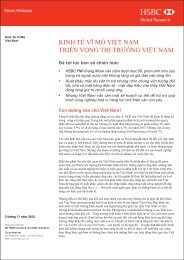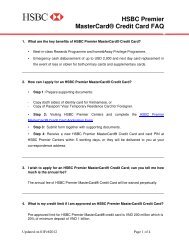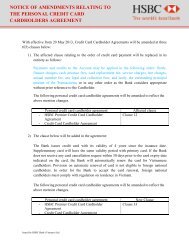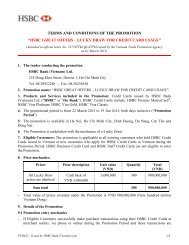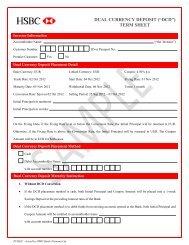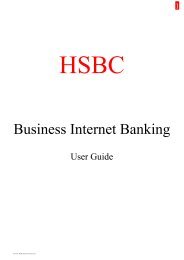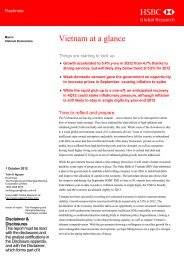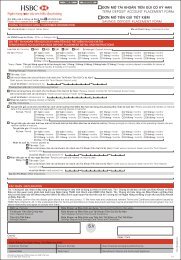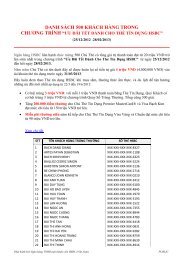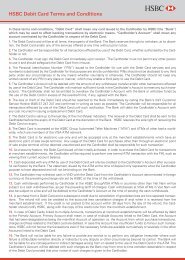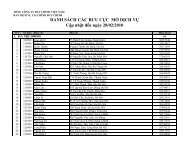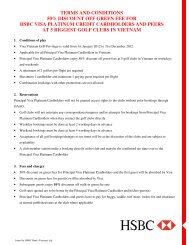HSBC Vietnam Manufacturing PMI December 2012
HSBC Vietnam Manufacturing PMI December 2012
HSBC Vietnam Manufacturing PMI December 2012
You also want an ePaper? Increase the reach of your titles
YUMPU automatically turns print PDFs into web optimized ePapers that Google loves.
<strong>HSBC</strong> Purchasing Managers’ Index Press Release<br />
Embargoed until: 09:00 (Ho Chi Minh City) 2 January 2013<br />
<strong>HSBC</strong> <strong>Vietnam</strong> <strong>Manufacturing</strong> <strong>PMI</strong><br />
<strong>Vietnam</strong> manufacturing production stagnates in <strong>December</strong><br />
Summary<br />
At 49.3 in <strong>December</strong>, down from 50.5 in November, the<br />
seasonally adjusted <strong>HSBC</strong> <strong>Vietnam</strong> <strong>Manufacturing</strong> <strong>PMI</strong><br />
posted below the neutral 50.0 mark for the eighth time<br />
in the past nine months. The latest deterioration in<br />
operating conditions mainly reflected reduced new order<br />
inflows, disinvestment of inventory holdings and<br />
stagnating production volumes.<br />
The average <strong>PMI</strong> reading in Q4 <strong>2012</strong> is 49.5, up from<br />
46.9 in Q3 and the highest outcome since the third<br />
quarter of 2011.<br />
After rising moderately in November, the level of<br />
manufacturing output was broadly unchanged during<br />
<strong>December</strong>. Companies indicated that where volumes<br />
had been sustained, this had been largely through the<br />
depletion of backlogs of work. Market conditions<br />
remained subdued overall, reflected in reductions in<br />
both domestic and new export orders. The level of new<br />
export business contracted for the eighth month running<br />
and to a greater extent than signalled in November.<br />
The muted performance of the sector has not yet<br />
filtered through to the labour market, as highlighted by<br />
job creation being recorded at manufacturers for the<br />
third successive month in <strong>December</strong>. Although the rate<br />
of increase in payroll numbers was again only mild, it<br />
was nonetheless still one of the fastest signalled since<br />
the survey began in April 2011. Higher employment –<br />
alongside efforts to sustain production volumes – was<br />
also a prime factor underlying the substantial drop in<br />
backlogs of work.<br />
Weak demand and rising cost-caution impacted on<br />
purchasing and stock holding decisions during<br />
<strong>December</strong>. Input buying volumes were unchanged<br />
compared to November levels, as lower demand<br />
discouraged companies from raw material purchasing.<br />
Meanwhile, a preference for reduced inventory holdings<br />
led to lower levels of pre- and post-production stocks.<br />
Average input prices declined for the first time in five<br />
months in <strong>December</strong>, although the rate of reduction was<br />
only slight. Lower purchasing costs were mainly<br />
attributed to weak demand for raw materials, especially<br />
in the domestic market.<br />
Comment<br />
Commenting on the <strong>Vietnam</strong> <strong>Manufacturing</strong> <strong>PMI</strong><br />
survey, Trinh Nguyen, Asia Economist at <strong>HSBC</strong> said:<br />
“The economy is stabilizing, as indicated by the output<br />
level. However, the economic recovery process is still in<br />
its fragile state as external demand remains weak and<br />
consumer confidence is subdued. Price discounting<br />
measures are being helped by a reduction of input<br />
prices. A third expansion of employment shows the<br />
resilience of the economy. Still, while things will likely<br />
improve marginally next year, significant changes to<br />
consumption behaviour are not expected unless<br />
meaningful reforms take place.”<br />
Key points<br />
• <strong>HSBC</strong> <strong>Vietnam</strong> <strong>Manufacturing</strong> <strong>PMI</strong> at 49.3 in<br />
<strong>December</strong><br />
• Output stagnates as new order inflows decline<br />
• Input prices fall for first time in five months<br />
Historical Overview<br />
<strong>HSBC</strong> <strong>Vietnam</strong> <strong>PMI</strong><br />
50 = no change on previous month<br />
55<br />
50<br />
45<br />
40<br />
Apr '11 Jun Aug Oct Dec Feb '12 Apr Jun Aug Oct Dec<br />
Sources: Markit, <strong>HSBC</strong>.<br />
Increasing rate of growth<br />
Increasing rate of contraction<br />
<strong>December</strong> saw average output prices decline for the<br />
eighth consecutive month, with the rate of decrease<br />
broadly in line with the average for this period. Lower<br />
factory gate prices were attributed to weak demand and<br />
strong competition.<br />
PUBLIC
For further information, please contact:<br />
<strong>HSBC</strong><br />
Trinh Nguyen, Asia Economist<br />
Telephone +852-2996-6975<br />
Email trinhdnguyen@hsbc.com.hk<br />
Giang Cao<br />
Hoai Anh Ly<br />
Head of Group Communications, <strong>HSBC</strong> Bank (<strong>Vietnam</strong>) Ltd Communications Manager<br />
Telephone +848-3829-2288 Telephone +848-3520-3483<br />
Email giangcao@hsbc.com.vn<br />
Email anh.hoai.ly@hsbc.com.vn<br />
Markit<br />
Rob Dobson, Senior Economist<br />
Caroline Lumley, Corporate Communications<br />
Telephone +44-1491-461-095 Telephone +44-20-7260-2047<br />
Email rob.dobson@markit.com Mobile +44-781-581-2162<br />
Email caroline.lumley@markit.com<br />
Notes to Editors:<br />
The <strong>HSBC</strong> <strong>Vietnam</strong> <strong>Manufacturing</strong> <strong>PMI</strong> is based on data compiled from monthly replies to questionnaires sent to<br />
purchasing executives in around 400 manufacturing companies. The panel is stratified geographically and by Standard<br />
Industrial Classification (SIC) group, based on industry contribution to <strong>Vietnam</strong>ese GDP. Survey responses reflect the<br />
change, if any, in the current month compared to the previous month based on data collected mid-month. For each of<br />
the indicators the ‘Report’ shows the percentage reporting each response, the net difference between the number of<br />
higher/better responses and lower/worse responses, and the ‘diffusion’ index. This index is the sum of the positive<br />
responses plus a half of those responding ‘the same’.<br />
The Purchasing Managers’ Index (<strong>PMI</strong>) is a composite index based on five of the individual indexes with the<br />
following weights: New Orders - 0.3, Output - 0.25, Employment - 0.2, Suppliers’ Delivery Times - 0.15, Stock of Items<br />
Purchased - 0.1, with the Delivery Times index inverted so that it moves in a comparable direction.<br />
Diffusion indexes have the properties of leading indicators and are convenient summary measures showing the<br />
prevailing direction of change. An index reading above 50 indicates an overall increase in that variable, below 50 an<br />
overall decrease.<br />
Markit do not revise underlying survey data after first publication, but seasonal adjustment factors may be revised from<br />
time to time as appropriate which will affect the seasonally adjusted data series. Historical data relating to the<br />
underlying (unadjusted) numbers, first published seasonally adjusted series and subsequently revised data are<br />
available to subscribers from Markit. Please contact economics@markit.com.<br />
<strong>HSBC</strong>:<br />
<strong>HSBC</strong> is one of the world's largest banking and financial services organisations. With around 6,900 offices in both<br />
established and faster-growing markets, we aim to be where the growth is, connecting customers to opportunities,<br />
enabling businesses to thrive and economies to prosper, and ultimately helping people to fulfil their hopes and realise<br />
their ambitions.<br />
We serve around 60 million customers through our four global businesses: Retail Banking and Wealth Management,<br />
Commercial Banking, Global Banking and Markets, and Global Private Banking. Our network covers 84 countries and<br />
territories in six geographical regions: Europe, Hong Kong, Rest of Asia-Pacific, Middle East and North Africa, North<br />
America and Latin America. Our aim is to be acknowledged as the world's leading international bank.<br />
PUBLIC
Listed on the London, Hong Kong, New York, Paris and Bermuda stock exchanges, shares in <strong>HSBC</strong> Holdings plc are<br />
held by over 221,000 shareholders in 134 countries and territories.<br />
About Markit:<br />
Markit is a leading, global financial information services company with over 2,300 employees. The company provides<br />
independent data, valuations and trade processing across all asset classes in order to enhance transparency, reduce<br />
risk and improve operational efficiency. Its client base includes the most significant institutional participants in the<br />
financial market place. For more information please see www.markit.com<br />
About <strong>PMI</strong>s:<br />
Purchasing Managers’ Index (<strong>PMI</strong>) surveys are now available for 32 countries and also for key regions including<br />
the Eurozone. They are the most closely-watched business surveys in the world, favoured by central banks, financial<br />
markets and business decision makers for their ability to provide up-to-date, accurate and often unique monthly<br />
indicators of economic trends. To learn more go to www.markit.com/economics<br />
The intellectual property rights to the <strong>HSBC</strong> <strong>Vietnam</strong> <strong>Manufacturing</strong> <strong>PMI</strong> provided herein is owned by Markit<br />
Economics Limited. Any unauthorised use, including but not limited to copying, distributing, transmitting or<br />
otherwise of any data appearing is not permitted without Markit’s prior consent. Markit shall not have any<br />
liability, duty or obligation for or relating to the content or information (“data”) contained herein, any errors,<br />
inaccuracies, omissions or delays in the data, or for any actions taken in reliance thereon. In no event shall<br />
Markit be liable for any special, incidental, or consequential damages, arising out of the use of the data.<br />
Purchasing Managers' Index and <strong>PMI</strong> are trade marks of Markit Economics Limited, <strong>HSBC</strong> use the above<br />
marks under license. Markit and the Markit logo are registered trade marks of Markit Group Limited.<br />
PUBLIC



